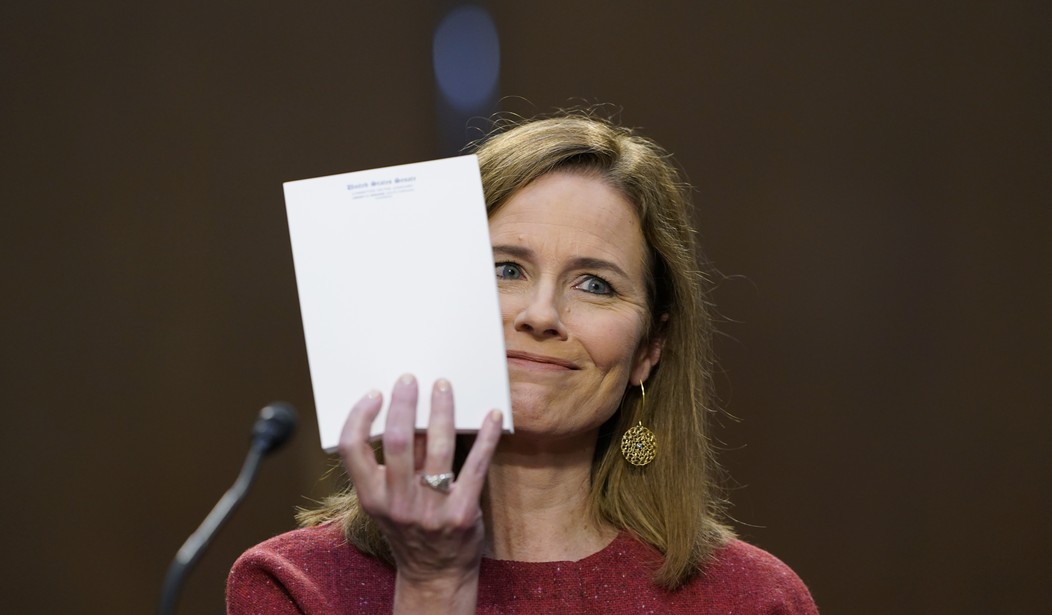Is this a tantalizing clue as to how Dobbs will go — and if so, to which side? Or is it just basic SCOTUS 101 advice?
Should we be nervous, especially given the audience and venue? Questions, questions …
Supreme Court Justice Amy Coney Barrett said Monday that judges are not deciding cases to impose a “policy result,” but are making their best effort to determine what the law and the Constitution require.
In a nation splintered by partisanship and wracked by incivility, Barrett in remarks at the Ronald Reagan Presidential Library appeared to acknowledge that expected court decisions on reproductive rights and gun control would be seen through a political lens and lead to division. She urged Americans to “read the opinion” and consider the court’s reasoning before making judgments about the outcome.
“Does (the decision) read like something that was purely results driven and designed to impose the policy preferences of the majority, or does this read like it actually is an honest effort and persuasive effort, even if one you ultimately don’t agree with, to determine what the Constitution and precedent requires?” she asked.
Americans should judge the court — or any federal court — by its reasoning, she said. “Is its reasoning that of a political or legislative body, or is its reasoning judicial?” she asked.
Most likely this is meaningless. This sounds like standard boilerplate from Supreme Court justices whenever the topic of politicization comes up. Barrett is for now the most junior member of the court, but with Ketanji Brown Jackson taking her seat on the first Monday in October, it’s probably a good time to remind audiences of the court’s approach to cases, controversial ones especially. Stephen Breyer made the media rounds a few months ago as part of his book tour and made the same points, arguing that his colleagues work in good faith and outside efforts for “reform” would backfire, creating the very situation that critics claim to want to fix.
Still, the Associated Press makes this sound like Barrett put this in the specific context of the upcoming decisions on Dobbs and NY State Rifle & Pistol. Jackson won’t have any input on those decisions at all, as Breyer will finish his term out on the court before going off to enjoy his retirement. If that’s how Barrett meant it, then it sounds a bit ominous that she felt compelled to issue that warning to a presumably conservative audience at the Reagan Library. It almost sounds a bit like expectations-setting, if — and that’s a big if — the AP has the context of those remarks correct.
Gulp. It’s worth noting that Barrett joined that curious decision yesterday with Kavanaugh and Roberts that split the conservatives on a Fourth Amendment basis for malicious-prosecution torts. That leaned fairly substantially in the direction of judicial activism and arguably overreaching on precedent to back it up. One has to wonder whether Barrett or Kavanaugh seem very committed to undoing judicial activism in other contexts, which could still be good news on the gun-rights case (based on Heller and McDonald findings of individual rights to bear arms) but perhaps not so much on Roe.
Even then, though, Barrett understands that her audience in these events is wider than the auditorium. Sure, she’s speaking to a presumably conservative crowd at the Reagan Library in the first instance, but Barrett knows that the media will report anything she says, especially as journalists anticipate the Dobbs decision. Why not plow the ground when given the opportunity to argue that the decisions might be controversial but that the arguments will be well grounded in jurisprudence rather than politics?
We’ll find out which it is when the court hands down these two decisions, I guess, and not a moment sooner. Best guess for publication, especially on Dobbs, will be about one hour before all nine justices have to board flights for summer vacations far away from the media frenzy to follow. In the meantime, reflect on Barrett’s highly interesting reflections on “super precedents” in a 2013 paper from her time as faculty at Notre Dame, as well as my skepticism in 2018 that Barrett, Kavanaugh, or Roberts would vote to overturn Roe. Events proved me wrong about such a challenge even reaching the Supreme Court, so … I’m hoping to get proven wrong again in June. But I’m nervous nonetheless.







Join the conversation as a VIP Member